- Home
- Jodi Picoult
The Book of Two Ways
The Book of Two Ways Read online
The Book of Two Ways is a work of fiction. Names, characters, places, and incidents are the products of the author’s imagination or are used fictitiously. Any resemblance to actual events, locales, or persons, living or dead, is entirely coincidental.
As of the time of initial publication, the URLs displayed in this book link or refer to existing websites on the Internet. Penguin Random House LLC is not responsible for, and should not be deemed to endorse or recommend, any website other than its own or any content available on the Internet (including without limitation at any website, blog page, information page) that is not created by Penguin Random House.
Copyright © 2020 by Jodi Picoult
All rights reserved.
Published in the United States by Ballantine Books, an imprint of Random House, a division of Penguin Random House LLC, New York.
BALLANTINE and the HOUSE colophon are registered trademarks of Penguin Random House LLC.
Grateful acknowledgment is made to John and Colleen Darnell for providing Egyptian text translations throughout the novel as well the images on this page and this page. Used by permission. Photo on this page: Inner coffin of Governor Djehutynakht Egyptian, Middle Kingdom, late Dynasty 11 - early Dynasty, 2010-1961 B.C., Object Place for Label: Notes: Egypt (Deir el-Bersha, Tomb 10, shaft A) Findspot: Egypt, Deir el-Bersha, Tomb 10, shaft A (Djehutynakht), Notes: Egypt (Deir el-Bersha, tomb 10 shaft A) Cedar, Length × width × height: 224.1 × 75 × 80 cm (88¼ × 29½ × 31½ in.) Museum of Fine Arts, Boston, Harvard University-Boston Museum of Fine Arts Expedition 21.962a.
Quotes from “The Nine Contemplations of Atisha” by Rev. Joan Jiko Halifax (Upaya Institute and Zen Center, www.upaya.org). Used by permission of the author.
LIBRARY OF CONGRESS CATALOGING-IN-PUBLICATION DATA
Names: Picoult, Jodi, author.
Title: The book of two ways: a novel / Jodi Picoult.
Description: First edition. | New York: Ballantine Books, [2020] |Includes bibliographical references.
Identifiers: LCCN 2019059326 (print) | LCCN 2019059327 (ebook) | ISBN 9781984818355 (hardcover: acid-free paper) | ISBN 9781984818362 (ebook)
Classification: LCC PS3566.I372 B66 2020 (print) | LCC PS3566.I372 (ebook) | DDC 813/.54—dc23
LC record available at https://lccn.loc.gov/2019059326
LC ebook record available at https://lccn.loc.gov/2019059327
International ISBN 9780593237762
Ebook ISBN 9781984818362
randomhousebooks.com
Book design by Simon M. Sullivan, adapted for ebook
Cover design and concept: Lynn Buckley
Cover illustration: Ben Perini
ep_prh_5.5.0_c0_r0
Contents
Cover
Title Page
Copyright
Epigraph
Prologue
Land/Egypt
Water/Boston
Land/Egypt
Water/Boston
Land/Egypt
Water/Boston
Land/Egypt
Water/Boston
Land/Egypt
Water/Boston
Land/Egypt
Water/Boston
Cairo to Boston
After
Dedication
Author’s Note
Bibliography
By Jodi Picoult
About the Author
To die will be an awfully big adventure.
J. M. BARRIE, Peter Pan
MY CALENDAR IS full of dead people.
When my phone alarm chimes, I fish it out from the pocket of my cargo pants. I’ve forgotten, with the time change, to turn off the reminder. I’m still groggy with sleep, but I open the date and read the names: Iris Vale. Eun Ae Kim. Alan Rosenfeldt. Marlon Jensen.
I close my eyes, and do what I do every day at this moment: I remember them.
Iris, who had died tiny and birdlike, had once driven a getaway car for a man she loved who’d robbed a bank. Eun Ae, who had been a doctor in Korea, but couldn’t practice in the United States. Alan had proudly showed me the urn he bought for his cremated remains and then joked, I haven’t tried it on yet. Marlon had changed out all the toilets in his house and put in new flooring and cleaned the gutters; he bought graduation gifts for his two children and hid them away. He took his twelve-year-old daughter to a hotel ballroom and waltzed with her while I filmed it on his phone, so that the day she got married there would be video of her dancing with her father.
At one point, they were my clients. Now, they’re my stories to keep.
Everyone in my row is asleep. I slip my phone back into my pocket and carefully crawl over the woman to my right without disturbing her—air traveler’s yoga—to make my way to the bathroom in the rear of the plane. There I blow my nose and look in the mirror. I’m at the age where that’s a surprise, where I still think I’m going to see a younger woman rather than the one who blinks back at me. Lines fan from the corners of my eyes, like the creases of a familiar map. If I untangle the braid that lies over my left shoulder, these terrible fluorescent lights would pick up those first gray strands in my hair. I’m wearing baggy pants with an elastic waist, like every other sensible nearly-forty woman who knows she’s going to be on a plane for a long-haul flight. I grab a handful of tissues and open the door, intent on heading back to my seat, but the little galley area is packed with flight attendants. They are knotted together like a frown.
They stop talking when I appear. “Ma’am,” one of them says, “could you please take your seat?”
It strikes me that their job isn’t really very different from mine. If you’re on a plane, you’re not where you started, and you’re not where you’re going. You’re caught in between. A flight attendant is the guide who helps you navigate that passage smoothly. As a death doula, I do the same thing, but the journey is from life to death, and at the end, you don’t disembark with two hundred other travelers. You go alone.
I climb back over the sleeping woman in the aisle seat and buckle my seatbelt just as the overhead lights blaze and the cabin comes alive.
“Ladies and gentlemen,” a voice announces, “we have just been informed by the captain that we’re going to have a planned emergency. Please listen to the flight attendants and follow their directions.”
I am frozen. Planned emergency. The oxymoron sticks in my mind.
There is a quick rush of sound—shock rolls through the cabin—but no screams, no loud cries. Even the baby behind me, who shrieked for the first two hours of the flight, is silent. “We’re crashing,” the woman on the aisle whispers. “Oh my God, we’re crashing.”
She must be wrong; there hasn’t even been turbulence. Everything has been normal. But then the flight attendants station themselves in the aisles, performing a strange, staccato ballet of safety movements as instructions are read over the speakers. Fasten your seatbelts. When you hear the word brace, assume the brace position. After the plane comes to a complete stop you’ll hear Release your seatbelts. Get out. Leave everything behind.
Leave everything behind.
For someone who makes a living through death, I haven’t given a lot of thought to my own.
I have heard that when you are about to die, your life flashes before your eyes.
But I do not picture my husband, Brian, his sweater streaked with inevitable chalk dust from the old-school blackboards in his physics lab. Or Meret, as a little girl, asking me to check for monsters under
the bed. I do not envision my mother, not like she was at the end or before that, when Kieran and I were young.
Instead, I see him.
As clearly as if it were yesterday, I imagine Wyatt in the middle of the Egyptian desert, the sun beating down on his hat, his neck ringed with dirt from the constant wind, his teeth a flash of lightning. A man who hasn’t been part of my life for fifteen years. A place I left behind.
A dissertation I never finished.
Ancient Egyptians believed that to get to the afterlife, they had to be deemed innocent in the Judgment Hall. Their hearts were weighed against the feather of Ma’at, of truth.
I am not so sure my heart will pass.
The woman to my right is softly praying in Spanish. I fumble for my phone, thinking to turn it on, to send a message, even though I know there is no signal, but I can’t seem to open the button on my pants pocket. A hand catches mine and squeezes.
I look down at our fists, squeezed so tight a secret couldn’t slip between our palms.
Brace, the flight attendants yell. Brace!
As we fall out of the sky, I wonder who will remember me.
* * *
—
MUCH LATER I would learn that when a plane crashes and the emergency personnel show up, the flight attendants tell them how many souls were on board. Souls, not people. As if they know our bodies are only passing through for a little while.
I would learn that one of the fuel filters became clogged midflight. That the second filter-clogging light came on in the cockpit forty-five minutes out, and in spite of what the pilots tried, they could not clear it, and they realized they’d have to do a land evacuation. I would learn that the plane came in short of Raleigh-Durham, sticking down in the football field of a private school. As it hit the bleachers with a wing, the plane tipped, rolled, broke into pieces.
Much later I would learn of the family with the baby behind me, whose row of three seats separated from the floor and was thrown free from the aircraft, killing them instantaneously. I would hear about the six others who had been crushed as the metal buckled; the flight attendant who never came out of her coma. I would read the names of the passengers in the last ten rows who hadn’t gotten out of the broken fuselage before it erupted in flame.
I would learn that I was one of thirty-six people who walked away from the crash.
When I step out of the examination room of the hospital we’ve been taken to, I’m dazed. A woman in a uniform is in the hallway, talking to a man with a bandaged arm. She is part of an emergency response team from the airline that has overseen medical checks by physicians, given us clean clothes and food, and flown in frantic family members.
“Ms. Edelstein?” she says, and I blink, until I realize she is talking to me.
A million years ago, I had been Dawn McDowell. I’d published under that name. But my passport and license read Edelstein. Like Brian’s.
In her hand she has a checklist of crash survivors.
She puts a tick next to my name. “Have you been seen by a doctor?”
“Not yet.” I glance back at the examination room.
“Okay. I’m sure you have some questions…?”
That’s an understatement.
Why am I alive, when others aren’t?
Why did I book this particular flight?
What if I’d been detained checking in, and had missed it?
What if I’d made any of a thousand other choices that would have led me far away from this crash?
At that, I think of Brian, and his theory of the multiverse. Somewhere, in a parallel timeline, there is another me at my own funeral.
At the same time, I think—again, always—of Wyatt.
I have to get out of here.
I don’t realize I have said this out loud until the airline representative responds.
“Once we get the doctor’s paperwork, you’re clear to leave. Is someone coming for you, or do you need us to make travel arrangements?”
We, the lucky ones, have been told we can have a plane ticket anywhere we need to go—to our destination, back to where the flight originated, even somewhere else, if necessary. I have already called my husband. Brian offered to come get me, but I told him not to. I didn’t say why.
I clear my throat. “I have to book a flight,” I say.
“Absolutely.” The woman nods. “Where do you need to go?”
Boston, I think. Home. But there’s something about the way she phrases the question: need, instead of want; and another destination rises like steam in my mind.
I open my mouth, and I answer.
I have heard these songs that are in ancient tombs,
What they say about aggrandizing the one on earth,
And diminishing the necropolis.
But why is such done against the land of eternity,
A just and righteous place without fear?
Mayhem is its very abomination!
No one there dreads another.
This land, without an opponent,
Is where all of our families rest
Since the beginning of time.
Those who will be born after millions and millions,
All shall go to it!
—From the Tomb of Neferhotep, as translated by Professors Colleen and John Darnell
MY MOTHER, WHO lived and died by superstitions, used to make us say together before we went on a trip: We’re not going anywhere. It was meant to trick the Devil. I can’t say I believe in that kind of thing, but then again, I didn’t say it before I left home, and look at where that got me.
Walking outside of the airport in Cairo in August feels like stepping onto the surface of the sun. Even late at night, the heat is a knife on your skin and comes in pressing waves. I can already feel a line of sweat running down my spine; I didn’t come prepared for this. I find myself in the middle of other people’s transitions: a rumpled, dazed group of tourists being herded into their minivan; a teen dragging duct-taped luggage from the back of an open cart to the curb; a woman securing her head scarf as it blows in the breeze.
Suddenly I am surrounded by men. “Taxi?” they bark. “You need taxi?”
There’s no hiding the fact that I’m a Westerner; it’s clear from my red hair to my cargo pants and sneakers. I nod, making eye contact with one of them, a driver with a thick mustache and a long-sleeved striped shirt. The other taxi drivers fall back, seagulls in search of another crumb.
“You have suitcase?”
I shake my head. Everything I have is in the small bag I carry over my shoulder.
“American?” the man replies, and I nod. A wide, white grin splits his face. “Welcome to Alaska!”
It is startling to think that fifteen years have passed, but that lame joke is still the go-to gag for visitors. I get into the backseat of his car. “Take me to Ramses train station,” I say. “How long?”
“Fifteen minutes, inshallah.”
“Shokran,” I reply. Thank you. I am stunned at how quickly the Arabic comes to my lips. There must be a space in the brain that stores the information you assumed you’d never need again, like the lyrics to “MacArthur Park,” or how to multiply matrices, or—in my case—anything Egyptian. When Meret was little, she used to say lasterday, which might mean five minutes ago or five years ago—and that is where I am right now. Like I stepped back into the moment that was left behind when I abandoned this country. Like it has been waiting all this time for me to return.
With the window down, I can already feel dust settling on me. In Egypt, everything is covered in sand—your shoes, your skin, the air you breathe. It even gets in your food. The teeth of mummies are worn down by it.
Although it is nighttime, Cairo is alive in all its contradictions. On the highway, cars share the space with donkey carts.
/> Butcher shops with meat hanging outside cozy up beside souvenir stands. A souped-up muscle car zooms past, leaving a throb of rap music in its wake that tangles with the loudspeaker reverb of the salat isha, the nightly Muslim call to prayer. We drive along the Nile, trash stewing on its banks. Finally, Ramses Station comes into view. “Fifty pounds,” the driver says.
There are no set taxi fares in Egypt; the driver tells you how much he thinks the ride is worth. I pass him forty pounds as a counteroffer and get out of the car. He gets out, too, and starts yelling at me in Arabic. “Shokran,” I tell him. “Shokran.” Even though this scene is common and nobody bats an eye, I feel my pulse racing as I walk up to the train station.
It is not easy to get to Middle Egypt as a Westerner. Tourists are not supposed to use the trains, so I don’t buy a ticket and instead wait for the conductor to find me and play dumb. At that point, the train is already moving and it’s too late, so he shrugs and lets me pay. Hours later, when I get off at my stop, in Minya, I am the only white person in the station. I’m nearly the only person in the station.
I was supposed to arrive at 2:45 A.M., but the train has been delayed, so it’s just after 4:00 A.M. It feels like I have been traveling for twenty-four hours straight. The only taxi driver at the Minya train station is playing a game on his mobile phone when I knock on his window. He takes one look at me, rumpled and dragging. “Sabah el-khier,” I say. Good morning.
“Sabah el-noor,” he replies.
I give him my destination, a little over an hour away. He takes the eastern desert road out of Minya. I stare out the window, counting the gebels and wadis—hills and valleys—that rise in the darkness at the horizon. At the security checkpoints, where boys too young to grow a beard hold battered old machine guns from the sixties, I wrap my scarf around my head and pretend to sleep.
The driver keeps stealing glances in the rearview mirror. He is probably wondering what an American is doing in a taxi in the heart of Egypt, the one section that isn’t on tourist itineraries. I imagine what I might say to him, if I had the courage or the language to do so.

 Small Great Things
Small Great Things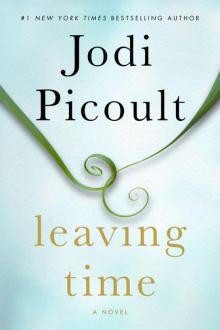 Leaving Time
Leaving Time Nineteen Minutes
Nineteen Minutes Larger Than Life
Larger Than Life Perfect Match
Perfect Match My Sister's Keeper
My Sister's Keeper The Pact
The Pact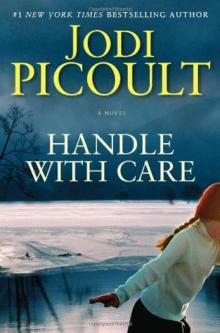 Handle With Care
Handle With Care Songs of the Humpback Whale
Songs of the Humpback Whale Mermaid
Mermaid The Tenth Circle
The Tenth Circle The Color War
The Color War Leaving Home: Short Pieces
Leaving Home: Short Pieces House Rules
House Rules Lone Wolf
Lone Wolf The Storyteller
The Storyteller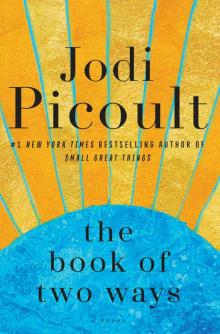 The Book of Two Ways
The Book of Two Ways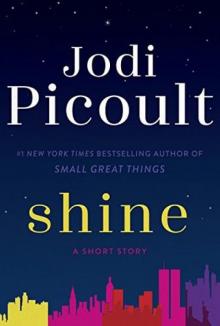 Shine
Shine Off the Page
Off the Page Sing You Home
Sing You Home Second Glance: A Novel
Second Glance: A Novel Mercy
Mercy Vanishing Acts
Vanishing Acts Between the Lines
Between the Lines Plain Truth
Plain Truth Salem Falls
Salem Falls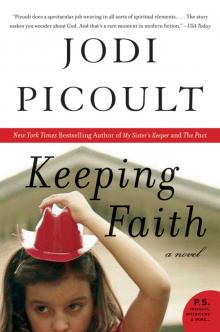 Keeping Faith
Keeping Faith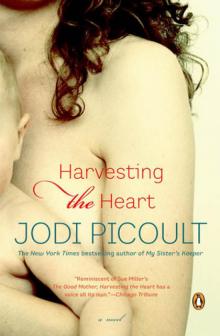 Harvesting the Heart
Harvesting the Heart Change of Heart
Change of Heart Where There's Smoke
Where There's Smoke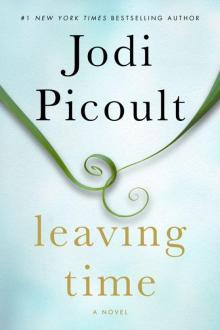 Leaving Time: A Novel
Leaving Time: A Novel Over the Moon
Over the Moon House Rules: A Novel
House Rules: A Novel The Jodi Picoult Collection #2
The Jodi Picoult Collection #2 Leaving Home: Short Pieces (Kindle Single)
Leaving Home: Short Pieces (Kindle Single) My Sister's Keeper: A Novel
My Sister's Keeper: A Novel![Mermaid [Kindle in Motion] (Kindle Single) Read online](http://i1.bookreadfree.com/i1/04/03/mermaid_kindle_in_motion_kindle_single_preview.jpg) Mermaid [Kindle in Motion] (Kindle Single)
Mermaid [Kindle in Motion] (Kindle Single) The Jodi Picoult Collection #4
The Jodi Picoult Collection #4 Sing You Home: A Novel
Sing You Home: A Novel The Jodi Picoult Collection
The Jodi Picoult Collection Lone Wolf A Novel
Lone Wolf A Novel Second Glance
Second Glance Larger Than Life (Novella)
Larger Than Life (Novella) The Jodi Picoult Collection #3
The Jodi Picoult Collection #3